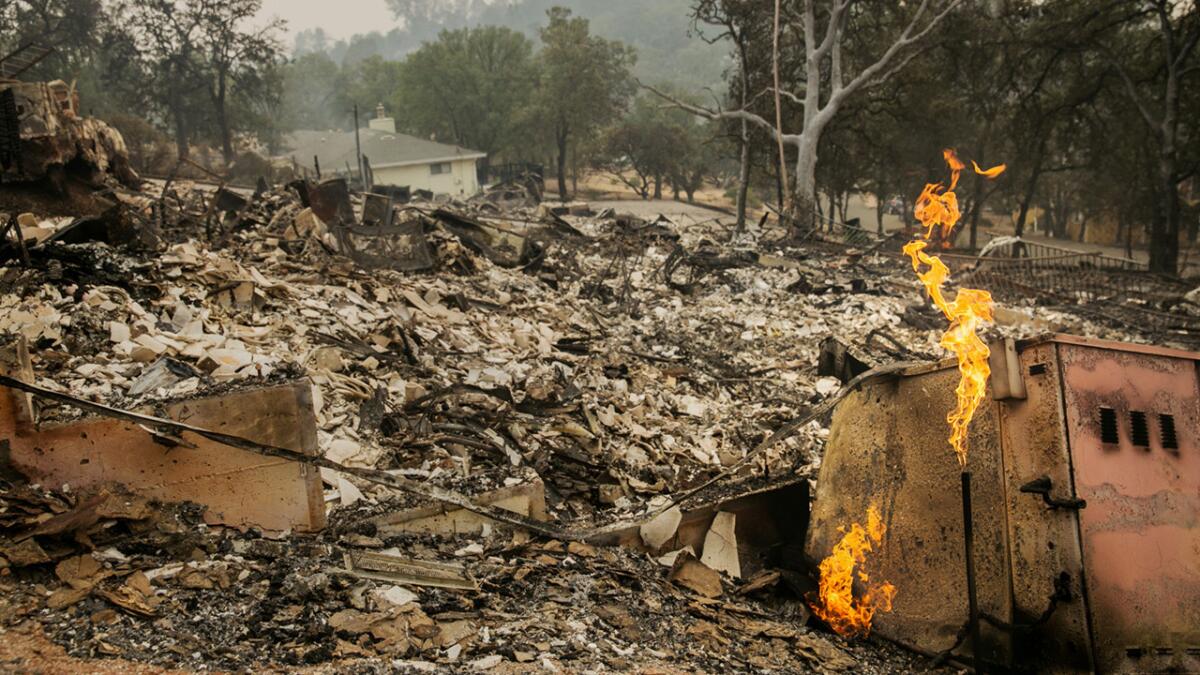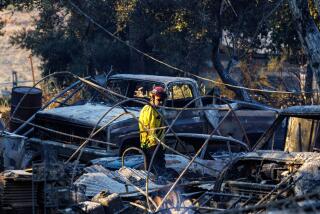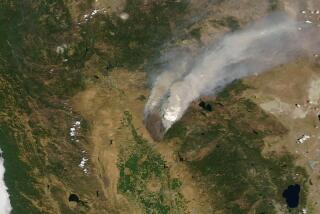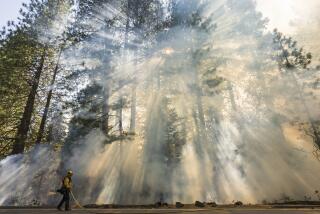Fire in Northern California continues to grow, killing 1 and displacing 13,000

The Valley fire tore through a half dozen homes in the residential community of Hidden Valley Lakes, near Middletown, Calif.
Reporting from MIDDLETOWN, Calif. — A ferocious wildfire in Northern California that has killed an elderly woman, displaced 13,000 residents and destroyed hundreds of homes continued to grow Monday, chewing through 1,000 more acres by the time night fell.
The explosive Valley fire, which broke out in Lake County on Saturday, has overwhelmed firefighters who have scrambled to keep up with its unpredictable nature. Consuming 62,000 acres -- about 97 square miles – it prompted the local sheriff to declare it the worst tragedy the area had ever seen.
The rain that fell Monday afternoon appeared to be a sign of reprieve, but fire officials warned that that was not the case.
“The reality is that a fire burning this hot, the falling rain never even makes it to the ground,” said Doug Pittman, a Cal Fire spokesman. “It’s vaporized before it gets to the fire.”
Pittman added that the landscape has become so desiccated that its response to water, even if sprayed directly on grass and trees, is minimal. A shift in other elements -- such as an increase in humidity or a decrease in wind speed -- would actually be more helpful.
The drop in temperature, however, has at least made conditions more comfortable for the 1,800 firefighters on the scene.
“We’ll take any and all precipitation that we can get,” Pittman said.
Shortly after the Valley fire began in the area of Cobb Mountain, residents began calling police for assistance with evacuations, Lt. Steve Brooks of the Lake County Sheriff’s office said in a statement. Hundreds of homes were evacuated in the first few hours.
California fire updates: The latest on the Valley and Butte blazes >>
Among the calls was a request that someone attend to a woman who was unable to leave her residence. The call was received by dispatch Saturday at 7:12 p.m., Brooks said. Officers and deputies responded to the area less than 20 minutes later and found the residence already engulfed in flames.
Human remains were found after the fire subsided, the statement said.
Authorities did not release the woman’s name, but her caretaker identified her to The Times as Barbara McWilliams, 72, a former special education teacher with advanced multiple sclerosis. The caretaker, Jennifer Hittson, 30, said McWilliams lived on Cobb Mountain, where even though her health was failing, she enjoyed feeding birds near her well-kept home. A neighbor confirmed that McWilliams’ home had burned to the ground, Hittson said.
According to Mark Ghilarducci of the Governor’s Office of Emergency Services, state and local agencies are working together to find out more details about her death as well as determining how many people are unaccounted for.
Four firefighters injured early in the fight were in stable condition, state fire officials said.
“We’re really in a battle with nature, and nature is more powerful than we are,” said Gov. Jerry Brown, who declared a state of emergency in Lake and Napa counties.
On Monday he was briefed on wildfires that have devoured tens of thousands of acres in Northern California.
Brown called for more funding for firefighting and said the fundamental obligation of government is public safety.
“This is damn serious stuff,” he said.
As tankers and helicopters waited on standby, flight commanders were unsure Monday whether they would be able to begin an assault on the Valley fire.
“It is the nightmare we feared,” said Jeff Tunnell, a federal fire behavior specialist.
With just 10% containment, even structures already ravaged by the fire are still under threat.
“The way it burned, it left so many pockets, the fire will turn around,” incident planning chief Rob Daugherty said at a morning briefing with fire personnel. “If you saved the house, today you’ll have to save the backside.”
At least 400 homes have been destroyed, many of which were in the communities of Middletown and Hidden Valley Lakes. Fire officials expected that number to increase dramatically after crews were able to assess the damage to structures on rugged terrain where access is limited.
Although a dense, gray sky helped minimize the spread of the fire Sunday, it also kept aerial crews grounded because of its effect on visibility.
“We had a hard time actually finding where parts of the fire were,” Daugherty said.
The same cloud cover a day later has crews worried that water and fire retardant drops will be delayed once more.
Smoke and dangerous conditions for air surveillance made it difficult for fire officials to assess how far through the hills the Valley fire had burned Sunday and where it had been most destructive.
The signature feature of the fire was its early explosive growth, fed by brush and trees dried by drought and last week’s blistering heat.
See the most-read stories this hour >>
The underlying cause is still under investigation, said Todd Derum, incident chief with Cal Fire.
“It was reported as a structure fire, but it was outside of the structure,” Derum said at a community meeting for evacuees held at the Calistoga fairgrounds. He said wind-blown embers quickly began igniting “spot fires” half a mile or more away in the drought-dried brush.
The fire roared through Middletown in the night. At the height of the blaze, fire hydrants went dry, and by Sunday morning the town, perhaps best known for the nearby clothing-optional Harbin Hot Springs retreat, was filled with smoking ruins.
Residents who sneaked past barricades to try to salvage keepsakes estimated that half the town had been destroyed.
Entire blocks were burned so thoroughly that it was difficult to tell how many homes they had once held. The path of destruction in places seemed capricious. Tidy new town homes with picket fences stood untouched next to a charred lot where three walls and a fireplace were all that was left.
Some landmarks like the Jolly Kone were still standing, but others, including a new elementary school that opened weeks ago and the hot springs resort, had burned.
“We tried the best we could, but it went structure to structure to structure,” Derum said.
In addition to the Valley fire, a dozen wildfires were burning actively in California. The largest has scorched more than 138,000 acres in the southern Sierra Nevada since it ignited July 31, according to the U.S. Forest Service.
More than 3,200 firefighters are battling the Rough fire, which is 40% contained and is threatening world-famous sequoia groves in and around Sequoia National Forest, according to the forest agency.
The Rough fire is one of hundreds ignited by a series of lightning strikes in California in late July. In Northern California, about 240 fires sparked by lightning collectively burned well over 200,000 acres, according to the Forest Service.
The other significant fire to break out recently was the Butte fire, which flared up Wednesday and has since raced through more than 71,000 acres of drought-stricken terrain about 45 miles northeast of Stockton, according to Cal Fire. With containment at 35%, that fire has destroyed 135 homes and 79 other structures, and Cal Fire officials said it is threatening an additional 6,400 structures, prompting evacuations.
St. John reported from Northern California and Branson-Potts and Knoll from Los Angeles. Times staff writers Patrick McGreevy in Sacramento and Matt Hamilton in Los Angeles contributed to this report.
Si desea leer esta nota en inglés, haga clic aquí
MORE ON CALIFORNIA WILDFIRES:
Old and new media play helpful roles during Valley fire
Chronicling the devastation of the Valley fire
Valley fire: Residents of Middletown tell harrowing survival tales
More to Read
Sign up for Essential California
The most important California stories and recommendations in your inbox every morning.
You may occasionally receive promotional content from the Los Angeles Times.













